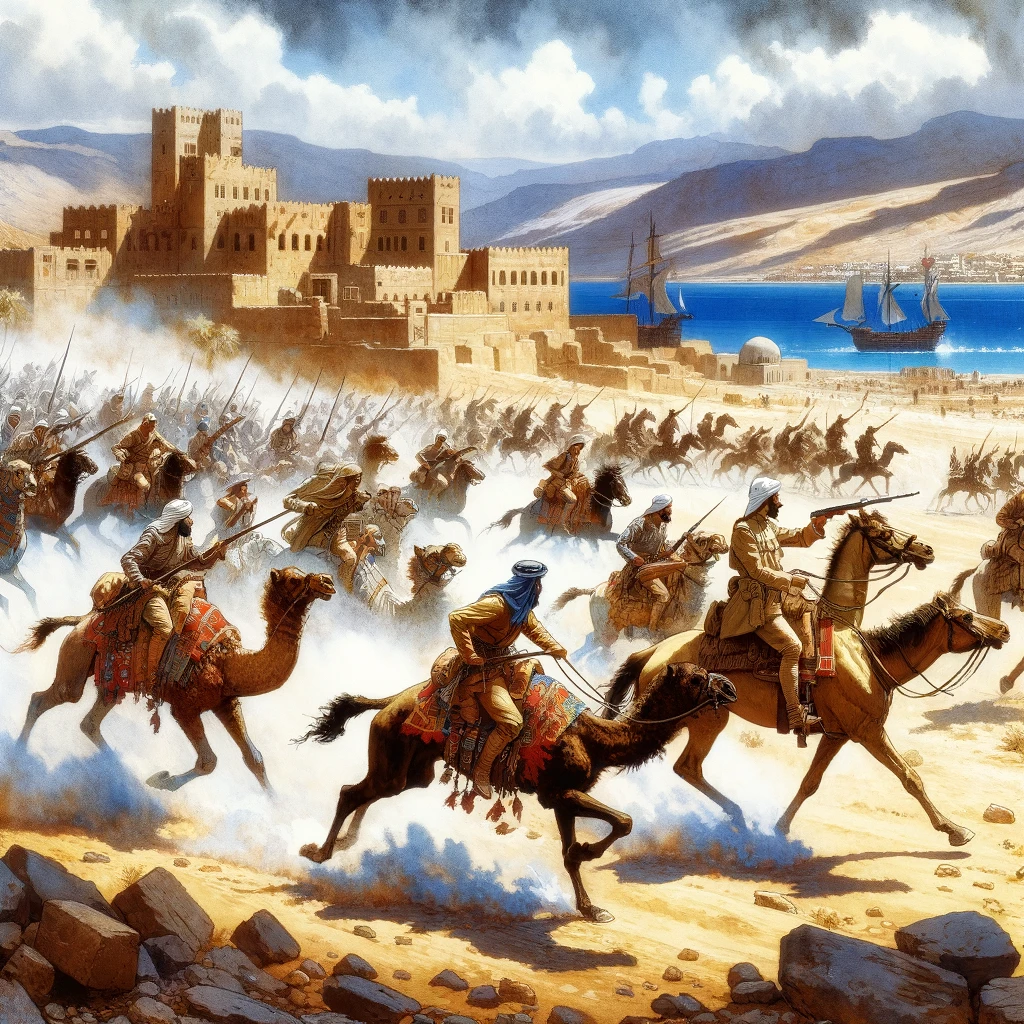In the interconnected web of global history, certain pivotal events serve as significant turning points, shaping the course of relationships between nations and regions. One such event, set against the backdrop of World War I, was the Battle of Aqaba. This influential campaign was launched in July 1917 by the British lieutenant Colonel Thomas Edward Lawrence, famously known as Lawrence of Arabia, and his guerrilla force of Sharifian troops. Their victory was not only a monumental feat in military strategy but also served as a crucial catalyst in the broader theatre of World War I. The significance of this campaign lies in the strategically important victory which majorly contributed to the Allied defeat of the Ottoman Empire and set the stage for the future shaping of British-Middle East relationships.
The Geopolitical Importance of Aqaba
Aqaba is more than just a mere geographical location; it is a strategic junction that has been coveted by empires throughout history. Its significance lies at the confluence of land and sea trade routes linking Asia, Africa, and Europe, making Aqaba a hub of geopolitical importance and a vital key for control over the Middle East. The Ottoman Empire, discerning this strategic value, regarded Aqaba as a critical element in their defence structure. Nature had blessed Aqaba with a natural harbour and an imposing fortress; both these features served as a bastion, defending the Ottoman-controlled Hejaz railway. In this context, the capture of Aqaba by Lawrence and his forces was not a mere military triumph but a strategic victory that shifted the balance of power in the Middle East and shaped the aftermath of World War I.

**
Tactical Overview of the Battle of Aqaba: July 1917
The Battle of Aqaba was a strategic masterpiece orchestrated by T.E. Lawrence and his Arab guerrilla force. Lawrence, an academic turned military strategist, recognized the potential to utilize the Arab Revolt to further British interests during World War I. His astute understanding of regional politics and strategic military approaches distinguished him as a standout figure during the war.
The alliance Lawrence formed with Prince Faisal and the Arab forces was instrumental in launching a successful guerrilla warfare campaign against the Ottoman forces. Utilizing the intimate knowledge of the rugged Arabian landscape and the unorthodox warfare techniques of the Bedouins, they were able to exploit the vulnerability of the fortified city of Aqaba. The Ottoman defenders, under the assumption that the arid desert on the landward side of Aqaba would act as a natural protection barrier, left it unguarded and focused their defense on the seafront.
This false sense of security allowed Lawrence and his forces to carry out a surprise attack from the unanticipated direction. Travelling across the “impassable” Nefud desert, they launched a swift and unexpected strike on Aqaba from the landward side, catching the Ottoman troops off guard. This unique approach exemplified the ingenuity and tactical brilliance of Lawrence and his Arab allies.
The outcome of this ingenious tactic was a resounding triumph for the Arab forces and their British allies. The capture of Aqaba marked a significant milestone in the Arab Revolt, substantially curtailing the Ottoman Empire’s influence and control in the region. This victory also facilitated the British forces’ subsequent military advances in Palestine and Syria. Thus, through the lens of strategy and outcome, the Battle of Aqaba stands as a testament to the groundbreaking military prowess of Lawrence of Arabia and the strength of the Arab Revolt.

Future shaping of British-Middle East relationships post WW I
Post World War I, the Battle of Aqaba had significant implications for the evolving British-Middle East relationships. The successful capture of Aqaba established Lawrence and his Arab Revolt allies as key contributors to the Allied war effort, and this fortuitously positioned Britain at a strategic vantage point in its plans for post-war control over the Ottoman Empire’s former territories.
The Sykes-Picot Agreement of 1916, which was a secret agreement between the United Kingdom and France, with assent from Russia and Italy, to carve up the Ottoman Empire amongst themselves, gained a new strategic foothold after the capture of Aqaba. Britain took the opportunity to further its interests in the region, characterized by plans to govern Palestine and Iraq while also controlling transit through the Suez Canal, a lucrative trade route. Simultaneously, Britain helped to construct a new political landscape, facilitating the establishment of Saudi Arabia and Transjordan (modern-day Jordan).
However, these geopolitical developments and the attendant broken promises of Arab independence engendered a complex mixture of gratitude, distrust, and resentment towards Britain amongst the Arabs. The Arab leaders, who had fought on the side of the Allies with the expectation of attaining independence and sovereignty over Muslim lands, felt deceived by Britain. The perceived betrayal fostered a deep-seated resentment that has cast a long shadow over the subsequent century of Anglo-Arab relations.
Ultimately, the Battle of Aqaba did more than shift the balance of power during World War I; it defined the contours of a new geopolitical order in the Middle East, shaped primarily by British foreign policy. While Britain managed to secure strategic territories and protect its economic interests, it also sowed the seeds of lasting discord and unrest in the region; a complex legacy that continues to influence British-Middle East relationships to this day.
Conclusion
The Battle of Aqaba, under the strategic genius of T.E. Lawrence, was more than a simple military triumph, it dramatically reshaped the course of the Middle East’s relationship with Britain after World War I. By understanding its implications, we are not only demystifying a historical event but also deciphering its influence on the 21st-century geopolitical canvas.
Set against the canvas of World War I, the Battle of Aqaba was a strategic tipping point favoring the Allies. It not only expedited the downfall of the Ottoman Empire but also ushered Britain into a dominant position within the Middle East. The shift resonated far beyond the battlefield, leaving an indelible footprint on the geopolitical landscape post-World War I. Britain established itself not only as a victor on the battlefield but also as a decisive force in shaping the destinies of nations like Iraq, Palestine, Saudi Arabia, and Jordan.
But amidst this reshuffling of power and territory, the seeds of discontent also germinated. The Arabs, who had initially partnered with the Britons, were left feeling deceived as the latter fell short of their promises of Arab independence. This assemblage of broken promises and geopolitical maneuvering injected a sense of resentment and distrust among the Arabs towards the British, casting a long shadow over the relationships in the coming century.
Thus, the Battle of Aqaba was an influential factor in defining the future shape of the British-Middle East relationships. But its significance is not confined to the past. With the relationships between the Middle East and Britain continuing to oscillate, Aqaba’s impact resonates in the present, shaping our perspective on the intricate dance of geopolitics and global history.


